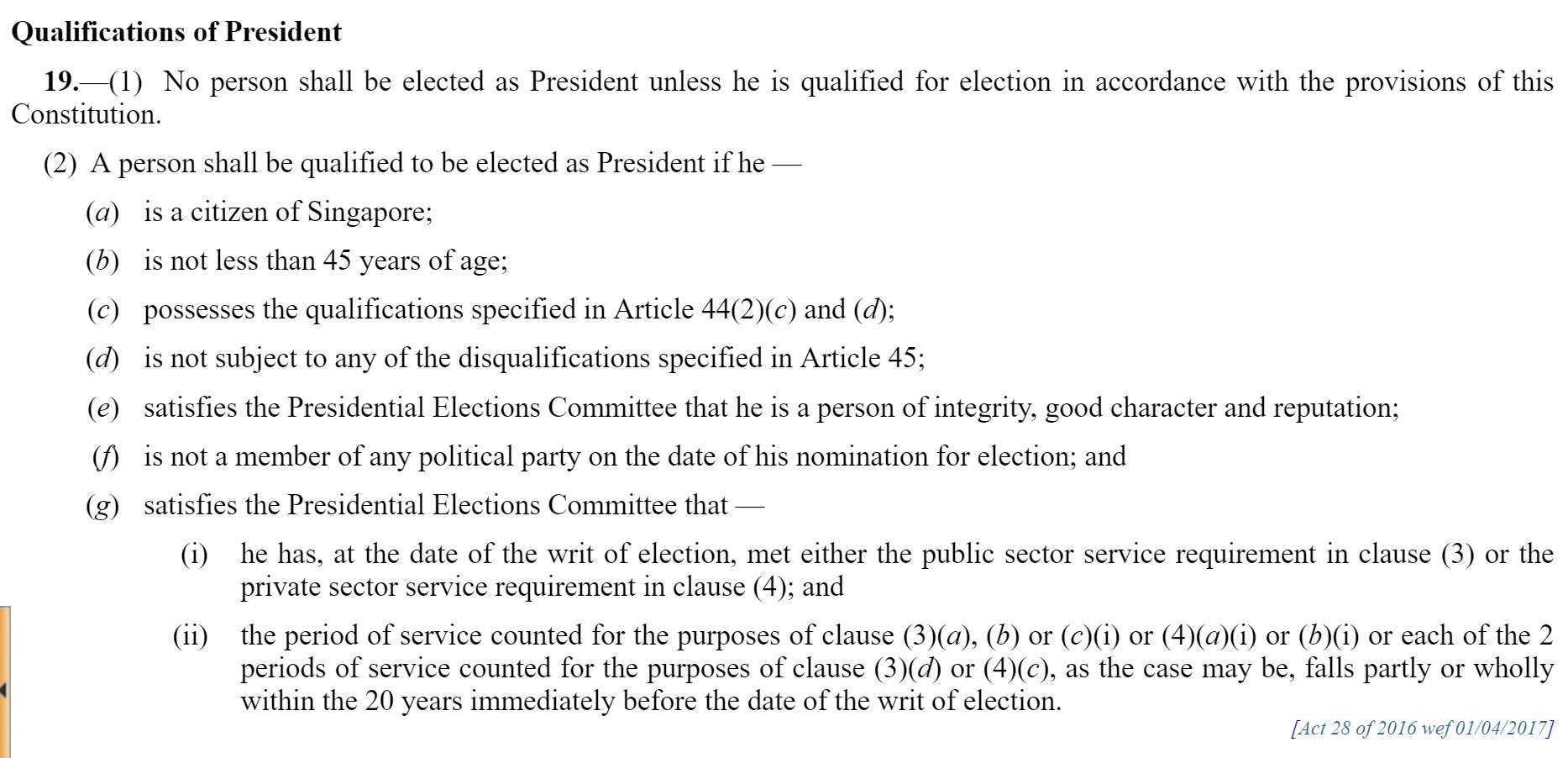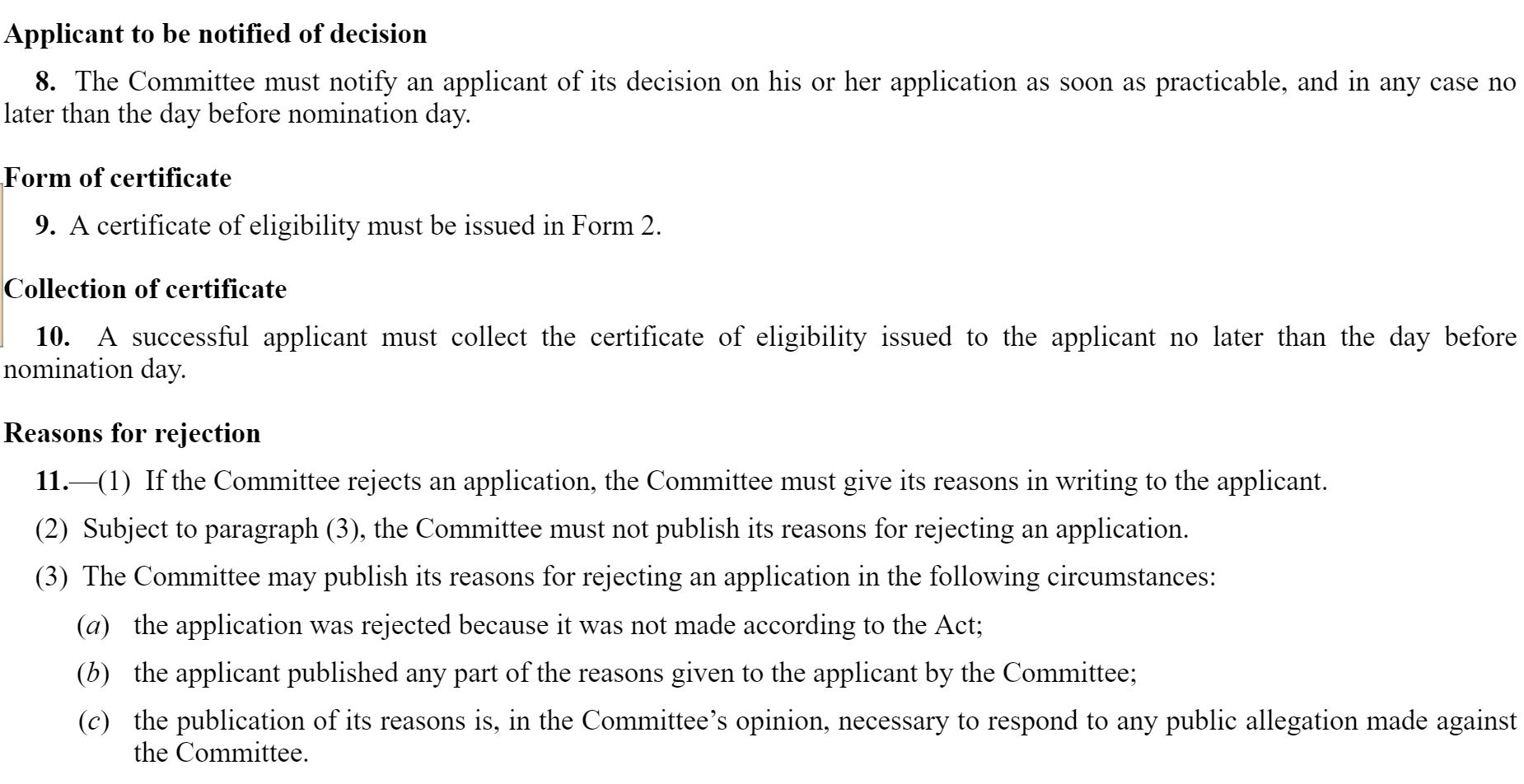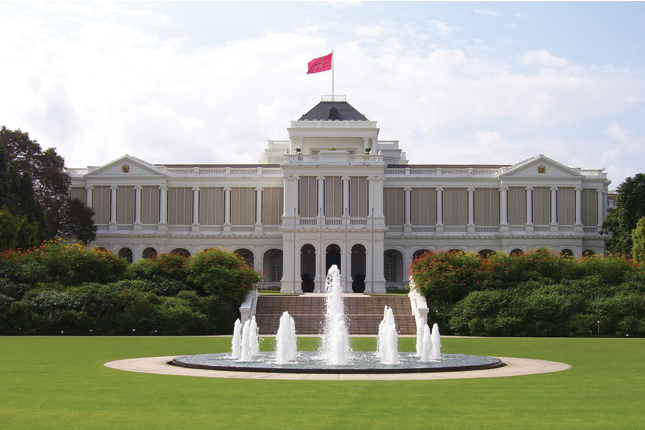On Sept. 4, the Elections Department announced that three people have applied for the Malay Community Certificate, on top of their applications for the Certificate of Eligibility to contest in the upcoming reserve election.
The Presidential Elections Committee (PEC) is now assessing the prospective candidates based on the criteria set out in Article 19 of the Constitution.
It will issue a certificate of eligibility (COE) to the candidates that meet the following requirements:
 Source: Singapore Statutes Online
Source: Singapore Statutes Online
PEC: What work does it really do?
Among the long list of criteria, the PEC's work is mainly focused on the more onerous Article 19 (e) and (g), which examines the prospective candidate's character and his service in the public or private sector.
Earlier this year, the government had accepted the recommendation in the Constitutional Commission Report to expand the PEC from three to six members, to "ensure that the PEC is better placed to discharge its functions", given the revisions that had been made in the qualifying criteria.
The current committee is made up of the following members:
- Eddie Teo (Public Service Commission chairman, who is the PEC chairman)
- Lim Soo Hoon (Accounting and Corporate Regulatory Authority (ACRA) Chairman)
- Chan Heng Chee (Presidential Council for Minority Rights (PCMR) member, appointed by the PCMR Chairman)
- Po’ad Shaik Abu Bakar Mattar (Former or current Council of Presidential Advisers (CPA) member, appointed by the CPA Chairman)
- Tay Yong Kwang(Person who is qualified to be or has been a Judge of the Supreme Court, appointed by the Chief Justice)
- Peter Seah (Person who has expertise and experience acquired in the private sector that is relevant to the functions of the PEC, appointed by the Prime Minister)
Based on the updated version of the Presidential Elections (Certificate of Eligibility) Regulations 2017 that came into effect on June 1, this is what the PEC will do before Nomination Day on Sept. 13.
 Source: Singapore Statutes Online
Source: Singapore Statutes Online
[related_story]
Long-standing Criticisms
Despite the changes to the EP system over the years, some long-standing criticisms continue to be made against the PEC.
a) Too much discretionary power
In the book Presidency, law expert Thio Li-ann said that the mechanism of selecting qualified candidates "removes the power of choice one step further away from the people, placing in the hands of an unelected group of people the power to decide who is a suitable candidate".
Indeed, the system appears to place too much discretionary power in the hands of a small group of unelected individuals, with no guarantee that they are extremely qualified to judge others in all industries and are unbiased.
For instance, how does the PEC assess the eligibility of two private sector candidates? Will the weight of the decision fall more on the two wise men who are from the private sector, rather than the three senior wise men (and woman) from the civil service?
b) Decisions beyond judicial review
The PEC also possess considerable discretion, given the subjectivity of the criteria.
Their decisions are not subjected to judicial review, nor do they appear to be accountable to anybody for their decision
In fact, Thio observed that the PEC is "not under a legal duty to give reasons for their decision, which is deficient as a process".
Some consider this process undesirable and deficient in an age where there is an increasing demand for transparency, participation and accountability in governance.
c) Uncertainty hinders able people from coming forward to serve
In a chapter in the book Managing Political Change in Singapore: The Elected Presidency, law academic Valentine Winslow said that the work of the PEC creates the embarrassment of uncertainty for a candidate seeking nomination.
This is because he (for instance, Farid Khan and/or Salleh Marican) may be rejected for reasons completely unclear to him.
Men of eminence will not come forward and agree to nomination if they are likely to be humiliated by rejection.
However, perhaps due to the tightening of the criteria for PE2017, Mothership understands from the Elections Department (ELD) that for the first time, the reason an application is accepted or rejected will be made known to the presidential election applicant only.
Nevertheless, a rejection by discretionary decisions will still cause humiliation, regardless.
This is because he will have to face the media and will be under pressure to decide whether he wants to reveal the reason.
Whatever happens, we will soon find out who our first Malay Elected President is before the end of September.
As what the late President S R Nathan once said: "The Presidency is not cast in stone, it's an evolving thing, just like the Constitution."
Hopefully, there will be further refinements to the system in future towards greater transparency and accountability that will help enhance the EP as an institution that every Singaporean understands and appreciate.
Top image from Istana
If you like what you read, follow us on Facebook, Instagram, Twitter and Telegram to get the latest updates.



